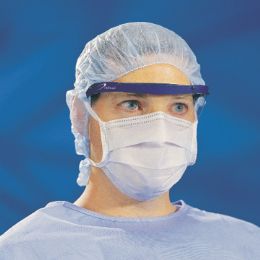




What is Specialty Eyewear?
While many people tend to wear the same pair of eyeglasses for most situations, there are certain kinds of work environments, recreational activities, hobbies and other kinds of scenarios that require more specialized lenses. A survey done by The Vision Council revealed the most important reasons that people use specialty eyewear includes safety features to protect the eyes from harm, to see better in general, and for specific activities such as sports, hobbies or work.
Although specialty eyewear comprises a wide variety of eyeglass configurations, the main selections in this category include prism, magnifying, protective/shielding, sports/cycling, and vibrating eyewear for the blind.
Choosing the Right Eyewear for the Task
Because eye health and safety is so important, it is crucial to ensure that the correct eyewear is chosen for the tasks at hand. Sports, athletic activities and cycling will require very different eye protection and vision enhancement than what would be appropriate for working in a medical environment. Learn more about various types of specialty eyewear that is available to determine the best choice for your unique requirements:
Prism Eyeglasses
Utilized primarily for positional correction, double vision (diplopia) and convergence correction, prism eyeglasses help the eyes to work together. Because one or both eyes may have a tendency to pull to the left or right, or up and down, prism lenses shift the image slightly in any of these directions, tricking the brain into thinking the eyes are working together. Prism eyeglasses can often be enough to correct these kinds of abnormalities, especially when the user has almost normal vision with either farsightedness or nearsightedness.
Specialty prismatic lenses are especially helpful while lying in a horizontal position, and help eliminate the doubled vision and other problematic eyeglass issues that occur in bed. Right-angle prisms enable a distortion-free changed line of sight, allowing users to lie in bed and read a book or watch TV without neck strain, as it makes the TV or book appear like it is directly in front of them. This makes prism eyeglasses a must-have for anyone recovering from surgery, injury or illness, and for anyone who is bedridden.
Magnifying Eyeglasses
Just like handheld magnifiers or magnifying glasses, magnifying eyeglasses help to make small objects appear bigger than they really are. Usually configured as specialized magnifying lenses that attach to eyeglasses and sunglasses, magnifying eyeglasses allow users to keep their hands free. This makes them perfect for hobbies, crafting, sewing and other close-up detail work, while they can also be utilized for other daily living activities that require enhanced vision, such as putting on contact lenses or for applying makeup.
Low vision users and those with hereditary visual conditions or macular degeneration can also benefit from the use of magnifying eyeglasses for reading, as well. Magnifying eyeglasses attachments can help all users to reduce the risk of eyestrain.
Eye Shields/Protective Eyewear
Even though The National Institute for Occupational Safety and Health (NIOSH) has reported that approximately 2,000 U.S. workers sustain job-related injuries to the eye that require medical treatment every day, eye doctors and safety experts firmly state that wearing the right eye protection can greatly lessen the severity of these injuries, or even prevent these injuries in 90% of the cases.
Common eye injuries include scrapes or cuts to the cornea, and contact with foreign objects, chemicals, flying wood or metal chips, grease and oil splashes, steam burns, and infrared or ultraviolet radiation exposure. Infectious diseases are also commonly transmitted through the mucous membranes of the eyes, occurring through direct exposure to blood and body fluid splashes, touching the eyes with contaminated hands, and from respiratory droplets generated from coughing.
Wearing specified protective eyewear is extremely important in reducing the risk of eye injury and/or disease proliferation. It is crucial to learn what kinds of eye safety dangers may be present in your workplace, and to know and wear the correct protective eyewear. Specially designed eye shields and other protective safety glasses offer significantly higher protection than normal eyeglasses. Many types of protective eyewear can fit over existing eyeglasses, as well.
Sports/Cycling/Recreational
Well suited for the outdoor enthusiast, sports or cycling eyeglasses offer a different kind of protection in a lightweight style. Often designed with interchangeable lenses for variations of sunshine or cloudiness, recreational specialty eyewear protects users’ eyes from the harmful rays of the sun, while they also help protect against wind, debris, dust and other materials that may get into the eyes while outdoors. These eyeglasses generally offer extremely durable, but lightweight frames, and high strength lenses to better stand up to tough outdoor usage.
Eyeglasses for the Blind
As technology becomes more advanced, it is increasingly being used to simplify and better integrate our daily activities. One of the best examples of this is a pair of eyeglasses designed specifically for blind users, the iGlasses created by a partnership between the Royal National Institute of Blind People (RNIB) in the UK and Canada’s AmbuTech Company. These sunglasses help users to identify nearby objects in their pathway through vibration.
Equipped with ultrasonic sensors that are placed on the front of the eyeglass frame, the iGlasses emit a pulsating vibration when they detect an object that is at waist level or higher in the user’s path. They are meant to be used as a secondary mobility device for the blind, and should always be used along with either a long cane, or a guide dog. Lightweight, comfortable and easy to learn how to use, specialty vibrational/sensory eyeglasses are a great way to enhance mobility and security for blind users.
Rehabmart is pleased to offer superior quality specialty eyewear from credentialed and renowned vendors that include LSS, Asa Products, Inc., MaxiAids and McKesson Medical-Surgical.
Hulet Smith, OT
Rehabmart Co-Founder & CEO
ck